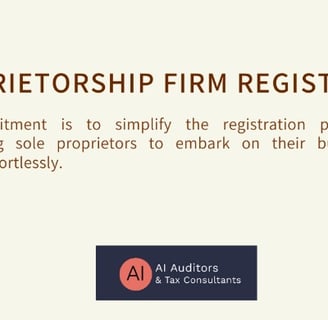Proprietorship Firm
Company Registration Services for Proprietorship Firm
Our Services
At AI Auditors, We provide Proprietorship Firm Registration Service.
Welcome to AI Auditors, where we specialize in providing seamless Proprietorship Firm Registration services tailored to your entrepreneurial journey. Our commitment is to simplify the registration process, empowering sole proprietors to embark on their business ventures effortlessly.
Why Choose AI Auditors for Proprietorship Firm Registration?
1. Efficiency and Expertise:
- Benefit from our efficient and expert team dedicated to guiding you through the Proprietorship Firm Registration process.
2. Personalized Solutions:
- AI Auditors understands the uniqueness of your business aspirations. Our services are customized to align with your specific needs.
3. Transparent and Timely Process:
- Experience a transparent and timely registration process, ensuring that you get started with your business operations promptly.
4. Comprehensive Support:
- From document preparation to submission, AI Auditors provides comprehensive support at every step, making the entire process hassle-free.
5. Expert Guidance:
- Rely on our expert guidance throughout the registration journey, ensuring a smooth and error-free process.
6. Tailored for Sole Proprietors:
- Our services are designed exclusively for sole proprietors, recognizing the individual nature of your business.
At AI Auditors, we go beyond providing a service; we become your reliable partner in turning your entrepreneurial dreams into a reality. Let us handle the intricacies of Proprietorship Firm Registration while you focus on building and growing your business. Welcome to a streamlined journey into entrepreneurship with AI Auditors!
Pros & Cons of Proprietorship firm
Pros of Proprietorship Firm in India:
1. Easy Formation:
- Proprietorship firms are easy and quick to form, requiring minimal formalities and documentation.
2. Sole Ownership:
- The proprietor has complete control and ownership of the business, allowing for quick decision-making.
3. Minimal Compliance Requirements:
- Proprietorship firms have fewer regulatory and compliance requirements compared to other business structures.
4. Direct Taxation:
- Income is taxed at the individual's tax slab rate, often resulting in simplified taxation.
5. Low Initial Costs:
- The initial setup costs and ongoing operational expenses are generally lower compared to other business structures.
6. Flexibility:
- The proprietor enjoys flexibility in business operations and can adapt quickly to changing market conditions.
7. Quick Decision-Making:
- With a single decision-maker, the decision-making process is swift and efficient.
Cons of Proprietorship Firm in India:
1. Limited Capital:
- Capital is limited to the proprietor's personal funds, making it challenging to raise large amounts of capital.
2. Unlimited Liability:
- The proprietor has unlimited personal liability for business debts, risking personal assets in case of business losses.
3. Limited Expertise:
- Relies on the skills and expertise of the proprietor, which may be limiting in terms of business growth.
4. Succession Challenges:
- The continuity of the business may be affected in case of the proprietor's illness, incapacity, or death.
5. Limited Credibility:
- Proprietorship firms may have limited credibility compared to larger business structures, affecting relationships with suppliers and customers.
6. Limited Funding Options:
- Limited options for raising funds, as banks and financial institutions may be hesitant to lend to sole proprietorships.
7. Limited Expansion Opportunities:
- Scaling the business may be challenging due to limited resources and a potential lack of expertise.
Tax Implication in India on Proprietorship firm
1. Income Tax:
- Proprietorship firms are taxed as per the individual tax rates applicable to the proprietor. The business income is combined with the proprietor's other sources of income.
2. Tax Slabs:
- The income earned by the proprietorship firm is taxed at the individual's applicable income tax slab rates. The slabs vary based on the individual's total income.
3. Business Expenses:
- Proprietors can claim deductions for legitimate business expenses, reducing the taxable income. It includes rent, utilities, depreciation, and other applicable costs.
4. GST Registration:
- Depending on the turnover, a proprietorship firm may be required to register for Goods and Services Tax (GST). GST is applicable to the supply of goods or services.
5. Presumptive Taxation:
- Proprietorship firms with a turnover of up to a certain threshold have the option to opt for presumptive taxation. It allows for the estimation of income at a predetermined rate, simplifying the tax calculation process.
6. Tax Audit:
- Proprietorship firms may be subject to tax audits if the turnover exceeds the specified limit. A tax audit ensures compliance with tax laws and the proper maintenance of financial records.
7. Advance Tax:
- Proprietors are required to pay advance tax if the tax liability for the financial year is expected to be Rs 10,000 or more. Quarterly payments are made to avoid penal interest.
8. Business Registration:
- While there is no specific business registration for proprietorship firms, obtaining a PAN (Permanent Account Number) and adhering to other tax-related requirements is essential.
9. Professional Advice:
- Seeking professional advice from tax consultants or chartered accountants is advisable to ensure compliance with tax regulations and to optimize tax planning.
Documents Required For Proprietorship firm
1. Identity Proof of the Proprietor:
- Aadhar card, passport, voter ID, or any government-issued identity document.
2. Address Proof of the Proprietor:
- Utility bills, rental agreement, or any official document confirming the residential address.
3. PAN Card of the Proprietor:
- Permanent Account Number (PAN) card of the proprietor.
4. Passport-sized Photographs:
- Recent passport-sized photographs of the proprietor.
5. Business Name and Activity Proof:
- A document specifying the proposed business name and a brief description of the business activities.
6. Address Proof of Business Place:
- Utility bills or rental agreement for the business premises to establish the physical address.
7. Bank Account Details:
- Bank statement or a canceled cheque bearing the name of the proprietor and the business.
8. Declaration of Compliance:
- A declaration by the proprietor confirming compliance with the rules and regulations.


Contacts
Socials
Subscribe to our newsletter
+91 9743234568
